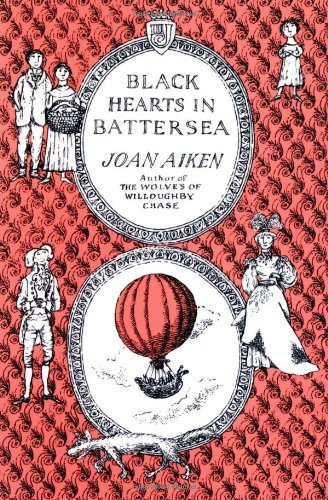
 Black Hearts in Battersea by Joan Aiken
Black Hearts in Battersea by Joan Aiken
Black Hearts in Battersea is the second book in Joan Aiken‘s beloved Wolves saga, beginning with The Wolves of Willoughby Chase and continuing in Nightbirds in Nantucket. Each book can be read separately and out of order (i.e., each is a separate story, not one big story broken into several parts), linked by re-appearing characters, plot lines and locations. Each is set in a cleverly devised “parallel universe” where historical figures and events are changed from what we would recognize in our own history books.
In this case, the action takes place in London, where Britain is ruled by good King James III and plagued by marauding wolves immigrating from Russia, with other little snippets of an alternative history slipped in to give the book a whimsical, but authentic air. Anyone who has read Diana Wynne Jones’s Chrestomanci books, or Philip Pullman’s Golden Compass/Northern Lights will have no trouble adapting to this new environment, but those who haven’t might be in for a pleasant surprise when they discover some of the little gems Aiken throws in: next to the familiar sights of Hyde Park and St Paul’s Cathedral are places such as Battersea Castle on the Thames, made of pinkish stone, and made ‘to look like a great half-open rose.’ With such a fascinating world to explore, it hardly seems to matter whether there’s a story or not.
But of course there is, and it perfectly combines with the backdrop Aiken sets for it. Young Simon the half-wild goose-boy, last seen being offered a painting career by Dr Field in The Wolves of Willoughby Chase arrives in London to begin his education at the Art Academy in Chelsea. But things are set to go wrong from the very beginning. On reaching Dr Field’s described boarding house, there is no sign of him, and the family Twite insists that they’ve never heard of him. Befriending their youngest daughter, the rude, filthy, bratty Dido Twite, Simon gradually begins to make his way around in London and at the Art Academy — discovering some very suspicious things concerning the Twites in the meanwhile.
He meets up with his old friend from the Poor Farm where he grew up: the lovely Sophie, who is now the handmaiden of the Duchess of Battersea, and with the young Duke-to-be Justin, a somewhat miserable and pathetic boy. In his ever-growing adventures, including visits with the eccentric Duke of Battersea, strange occurrences at the Twites, and a highly enjoyable visit to the Fair, Simon comes to uncover a terrible Hanoverian plot to overthrow the king, and the secret to his own mysterious past. With plenty of wolves, fireworks, shipwrecks, kidnappings, subterfuges, maroonings, hot air balloons, explosions, false identities, lucky escapes and poisoned mince pies, Black Hearts in Battersea is a great read, and even better if it’s read aloud, either to your own kids or a classroom (the lower classes’s Cockney accents in particular are wonderfully created in Aiken’s language).
Of course, it is unashamedly filled with quirks, coincidences and long stretches of credibility that will have anyone over the age of eight that enjoy nice, sensible stories raising an eyebrow in skepticism. To read the book critically would destroy any enjoyment one might have of it, as it is most certainly not to be taken too seriously. How could you when you have lines like: “My own dear husband’s dead brother’s long-lost child!” Just sit back and enjoy the story, complete with its exaggerations and unlikelihoods, as it harks back to another era where such occurrences were taken dead-seriously.
The Wolves Saga is a little known, but fantastic series, and I’m sure the previously-mentioned authors (Diana Wynne Jones and Philip Pullman) owe a lot to Joan Aiken‘s methods of alternative-history, as she is the first “modern” writer to the best of my knowledge to instigate such a device. Her characters are great fun (though Bonnie and Sylvia of Wolves of Willoughby Chase were sadly missed) and her stories filled with non-stop excitement and discovery.



It would give me very great pleasure to personally destroy every single copy of those first two J. J. Abrams…
Agree! And a perfect ending, too.
I may be embarrassing myself by repeating something I already posted here, but Thomas Pynchon has a new novel scheduled…
[…] Tales (Fantasy Literature): John Martin Leahy was born in Washington State in 1886 and, during his five-year career as…
so you're saying I should read it? :)